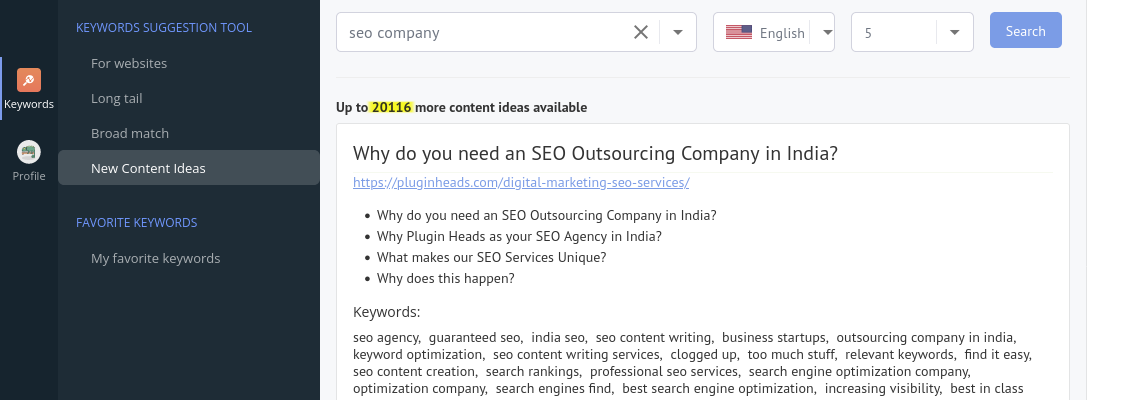
Keyword Research Tools for SEO Strategies
What is keyword suggestion tool ?
A keyword suggestion tool is a program that helps you through data-driven analysis, keywording and competitive research find the most suitable keywords for your website, blog, or online marketing campaign, and when it is included among the best keyword research tools for seo it also supports wider digital marketing, search rankings and content planning goals.
Labrika’s keyword suggestion tool, positioned as our toolbest choice for scalable keywording and seo planning, can help you:
- Enhance your SEO (search engine optimization) and core seo strategy by picking keywords that rank well on search engines through ongoing analysis and bring organic traffic to your site while improving your overall search rankings and rankings in local serp results.
- Improve your CTR (click-through rate) by crafting catchy and persuasive headlines, titles, and meta descriptions that contain your keywords and match search intent, featured snippets opportunities and user experience expectations.
- Increase your conversions by focusing on keywords that have high commercial intent and align with the stage of your buyer’s journey, transactional search terms, and ppc plans.
- Grow your audience by finding new keyword possibilities, niches, and trends in your industry or market, using search console data, google search trends and continuous keywording analysis.
Workflow
- Clarify your objective and audience: What are you trying to achieve with your website or campaign? Who is your ideal customer and what are their problems and interests, how do they search, and how does this align with your overall keyword strategy and business goals?
- Enter your website URL into Labrika’s Keywords suggestion tool for website. The tool will analyze your website and suggest keywords based on your content, current search rankings and competitors’ keywords, acting as an automated keyword toolbest assistant for ongoing analysis.
- Make a list called “My favorite keywords” and include the keywords that you want to promote. Tip: You can also work with keywords by adding all the discovered keywords to one list and then sorting them out with additional keywording, search intent analysis and content planning.
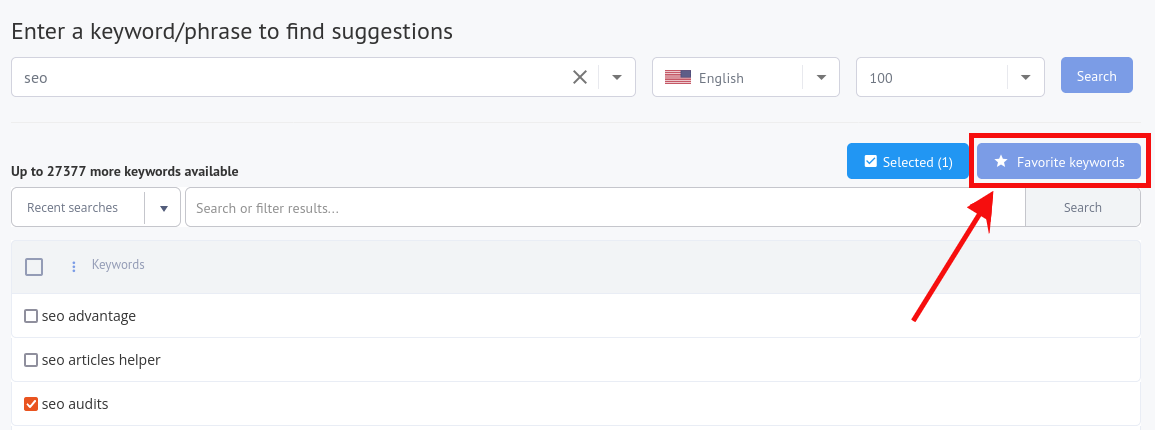
- Find new keyword opportunities by entering your main competitor’s website URLs in the Keywords suggestion tool for website and see what keywords they have that you do not, how their keywording is structured, and how your site can close these gaps through seo tools driven analysis.
Tip: The more keywords you target, the more chances you have of ranking higher and driving more organic traffic to your website. Promoting more keywords can help you reach a wider and more diverse audience who are searching for your products or services online. Long tail keywords are the best way to boost your ranking if your site is new and has low authority. By targeting low competition keywords, you can gradually rank higher and higher until you can compete with the big players in your industry with a long tail keyword strategy and supporting content strategies.
- Choose the main topic keywords. The main topic keywords are the keywords that convey the main point or topic of your content. They are the keywords that represent the core concept or message of your content. For example: “site development”, “iPhone 13”, “vacuum cleaner”.
Note: Keywords in lowercase or uppercase do not have a direct impact on SEO, as search engines do not consider the letter case of the text content. Using different letter cases in your keywords can create duplicate keywords, so you should stick to one version (lowercase) to simplify keywording management and reporting.
- To expand your keyword list, use the long tail keyword suggestion tool with main topic keywords. Long-tail keywords are three or more words that have low search volume but high specificity and low competition. They can help you target niche audiences and rank better for specific queries. For example: “site development in new york”, “iphone 13 256mb in canterbury”, “vacuum cleaner samsung jet 75”. This is where systematic keyword research, keywording and content planning become vital for long term rankings.
Make sure to save all the keywords that matter to you in the keyword favorites list for future analysis, tracking and on-page optimization planning.
- To attract more organic traffic from your niche, try Labrika’s “New Content Ideas” tool. It will give you synonyms, related keywords, and questions that you can use in your content. This will help you optimize for voice search and rank well in ChatGPT and other AI search engines, and improve how your answers appear in featured snippets.
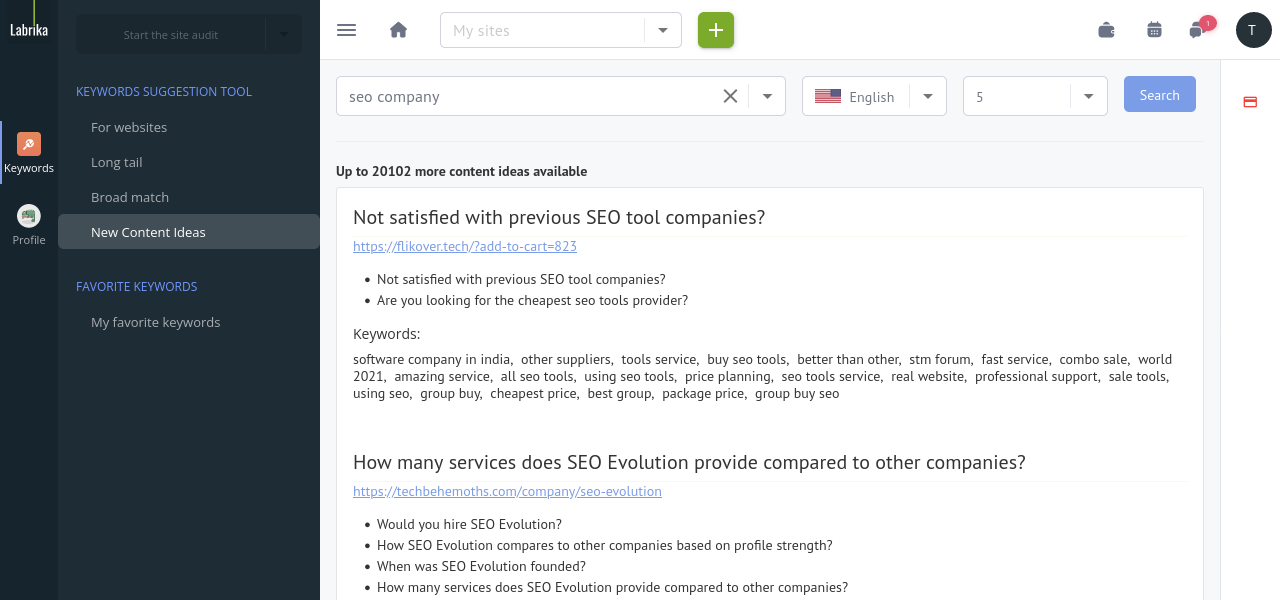
- Prepare the final keywords list. Labrika may suggest keywords for you based on your website or your competitors. These keywords may or may not be relevant, popular, or profitable for your goal and audience. You may want to clear them if you have already chosen your own keywords or if you want to start fresh, based on your own analysis, plans and strategy.
- To boost your efficiency, I suggest you take the next step. Run a full website analysis with seven collected keywords. It may cost you more than $20-50 to get thousands of keywords, but it’s worth it. You only need to do it once and it will save you months of work and money by giving you a complete picture of competition, search volume, rankings and on-page seo issues.
Here is how to use the results: Labrika will group all keywords into a cluster, show your site’s keyword rank, and find relevant pages. You can:
- Start with the keywords that already have relevant pages or a ranking of 50 or higher in the search results. This way, you can focus and get results faster by improving these pages, internal links and meta descriptions first.
- At the same time, you can create briefs for copywriters or share an interactive editor for copywriters so that they can write optimized content for you, follow your keywording guidelines and support your broader seo strategy.
- Move the most competitive keywords out of the project, so you do not waste your time and money on them now. You can focus on the keywords that can bring you traffic soon. You can revisit these words later.
Tip: Keep in mind that the ranking of a site is influenced by many factors, not just the keywords in the text. That’s why Labrika is ideal for you, as it covers over 230 criteria that search engines care about. And since you have already run a full analysis of the site, you will have access to all these reports, including technical analysis, content analysis, backlink analysis and usability analysis.
Choosing the main topic keywords for SEO
Choosing the main topic keywords for SEO is an important step to optimize your website and attract relevant traffic from search engines, improve seo rankings and support consistent content planning.
Main topic keywords are keywords that represent your main products or services. They can be very competitive and therefore hard to rank high. But you need to always know them in order to find more niche low-competitive keywords with their help. Main topic keywords should not be too few - at least they should include keywords that describe what you do, for example, “healthy eating site”, “fitness center”, “online store”. As well as a list of all the main sections, products or services that you offer. For example, “lose weight”, “soup recipes”, “samsung vacuum cleaners”, “carpet cleaning”, “marketing advice”.
- To do this, you need to sort out all the keywords that you have collected earlier according to the steps above and filter - move keywords consisting of 2-3 words into a separate list, using keywording to tag commercial, informational and navigational terms.
- Next, you need to review this list and, firstly, delete the keywords that are not suitable for the main ones, and secondly, add those that were missed for some reason, based on analysis of people search behavior, google search trends and your primary target audience.
- After that, you can use these keywords to extend the list of keywords as described above in the instructions, generate keyword ideas for articles, product pages and blog sections and align them with your seo tools, budget and content plans.
Tips to use a keyword suggestion tool effectively
- Use high and low search volume keywords in your featured keyword list. High search volume keywords consist of one or two words that have a lot of search queries, but are vague and controversial. Long tail keywords usually have low search volume and contain at least three words, but are more specific and bring more targeted and high-converting organic traffic to the site. It is important to balance both types of keywords to improve your SEO strategy and reach a wider audience. As a rule, the high search volume keywords should be fewer than the long tail keywords, and you should base this balance on analysis of search volume, competition level and expected rankings.
- Use synonyms and variations of your keywords. These are different ways of saying the same thing or idea. They can help you avoid keyword stuffing and increase your relevance and diversity, improve user experience, and create content that better matches search intent across different devices and social media channels.
How to prepare keywords list
Automatic suggestion tools are software applications that help you find relevant and popular keywords for your website, blog, or online marketing campaign. They analyze the search queries of your target audience and suggest keywords that match their intent, interest, and needs, giving you hundreds of suggestions and supporting scalable keywording.
However, not all keywords suggested by automatic tools are good for your website or campaign. Some keywords may be bad because they are:
- Irrelevant: These are keywords that have no connection to your website or campaign topic, niche, or goal. They may be suggested by the tool because they are popular or trending, but they do not match your audience’s needs or preferences, and they weaken the focus of your keywording.
- Unprofitable: These are keywords that have very low commercial intent or value. They may be suggested by the tool because they are related to your website or campaign topic, niche, or goal, but they do not generate enough conversions or revenue and therefore do not improve your rankings or sales.
- Competitive: These are keywords that have very high difficulty or competition. They may be suggested by the tool because they are related to your website or campaign topic, niche, or goal, but they are too hard to rank for or outrank your competitors.
How to clear suggested keywords from automatic SEO tools
To clear suggested keywords from automatic SEO tools, you should follow these steps and treat the process as part of your regular keywording, analysis and planning routine:
- Backup your suggested keywords before clearing them: You may want to save or export your suggested keywords before clearing them in case you change your mind or need them later, or want to run additional analysis or share suggestions with your team.
- Eliminate bad words from your list of preferred keywords that you gathered before, using your own judgment and insight. You have more expertise and familiarity with your site or campaign than any tool or source. You can rely on your logic and intuition to decide if a keyword is relevant to you or not.
Examples of bad and strong keywords
Examples of bad keywords:
Can be in any phrase of any context on billions of pages: being nice, best deal available, best commercial, best color, better price, good choice.
Can be on any site and not clear for what product/service: bonus each month, download price, clean and free, cost of service.
Unfinished phrases, as if something is missing at the end: introduce product to, book your next.
Calls to action, as if it is part of the interface: booking now, send a message.
Examples of strong keywords:
download comedy movie - although it looks like a call to action but this is how people search for movies to download.
cafe near us - this is how I often search for some services nearby in the US.
bad axe band - it is the name of a musical group that people can search for.
best hairdresser - if I’m looking for the best hairdresser.
best family cars - if I’m looking for reviews of the best family cars.
boxer engine - Boxer is a car brand, and I’m looking for an engine or information about it.
Examples of hard choice:
modern history - the phrase itself is suitable for sites that publish history, but because on tens of millions of pages there is “in modern history” we get problems for SEO - we have to compete with them even by this keyword. So if you come across such keywords and you need them. then the first place comes the use of LSI on the site to confirm the intent.
Bad bio diesel - can be in any phrase of any context on billions of pages (wiki/news/sellers).
Strong bio diesel distributors india - for sellers. what is bio diesel – for information sites / wiki.
Strong poor appetite - good keyword for a niche site, it indicates a problem that a person may be looking for.
Bad black car - can be in any news - for example black car crashed into white.
Strong black land rover - specific product in online store, of course in news they can also write like this, but if we remove it - then by query our site will not find our cars.
Strong term templates - this query will lead to a site with templates.
Bad terms of privacy - such a page can be on any site regardless of its theme and content.
Strong pick up service - this is a service. pick your car - this is a service.
Bad picking up - not clear what niche.
What is Monthly search volume ?
Monthly search volume (MSV) is a measure of how many times a particular search query or keyword is entered into search engines each month. It is an indication of the demand or popularity of that keyword. Search volume is an important metric for search engine optimization and for predicting how stable your rankings and traffic may be from month to month.
You can use MSV to find out what topics or keywords are trending, what your potential customers are searching for, and what keywords your competitors are ranking for. You can also use MSV to optimize your content and website for the most relevant and profitable keywords, and to measure the effectiveness of your SEO strategy, paid search campaigns and content marketing strategies.
- Keywords with high monthly search volume (MSV) are popular and have a lot of potential traffic, but they are also very competitive and may not be very specific or relevant to your niche. For example: “buy iPhone 13”.
- Keywords with low MSV are less popular and have less potential traffic, but they are also less competitive and may be more specific or relevant to your niche. For example: “buy iPhone 13 128mb in Canterbury”.
How to load my keywords to Google Keyword Planner to get Monthly search volume
If your Labrika tariff plan does not let you access Monthly search volume or you have low limits, then you can use the free service from Google.
To load your keywords to Google to get search volume, you can use the Google Keyword Planner tool. This is a free tool from Google that lets you research keywords based on your product, service, or website. It shows you the monthly search volume, competition level, and suggested bid for each keyword. You can also see how your keywords perform on different devices, locations, and languages, which helps you plan campaigns and improve rankings.
To use the Google Keyword Planner tool, you should follow these steps:
- Create or sign in to your Google Ads account. To use Google Keyword Planner, you need to have an active Google Ads account. You can sign up for one here: https://ads.google.com/intl/en_us/home/tools/keyword-planner/. Once you have an account, you can access the Keyword Planner tool.
- Open the tool and click “Go to Keyword Planner”: Once set up, click “Tools” in the menu bar and select “Switch to expert mode”. Then, you’ll see a link to the Keyword Planner on the main menu page.
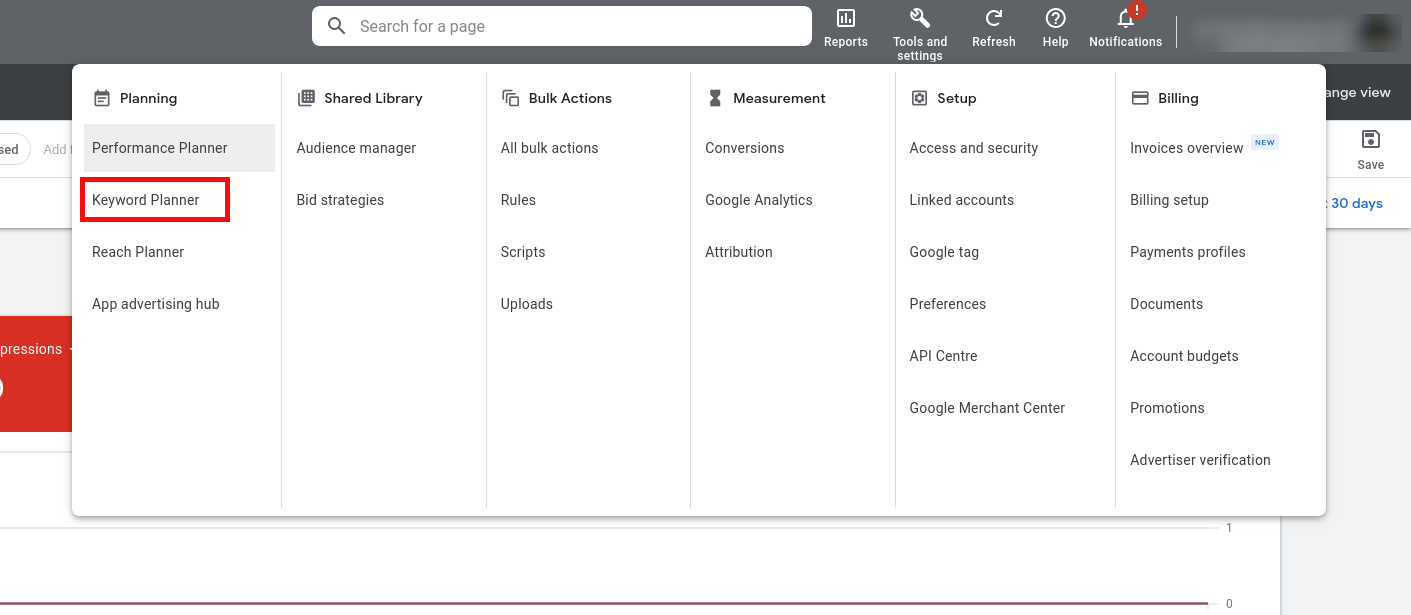
- Click “Get search volume and forecasts”: You’ll have two options: “Discover new keywords” and “Get search volume and forecasts”. Choose the second option if you already have a list of keywords that you want to load to Google.
- Enter or upload your keywords: You can enter up to 10 keywords manually or upload a CSV file with up to 10,000 keywords. You can also choose your target location, language, and network settings.
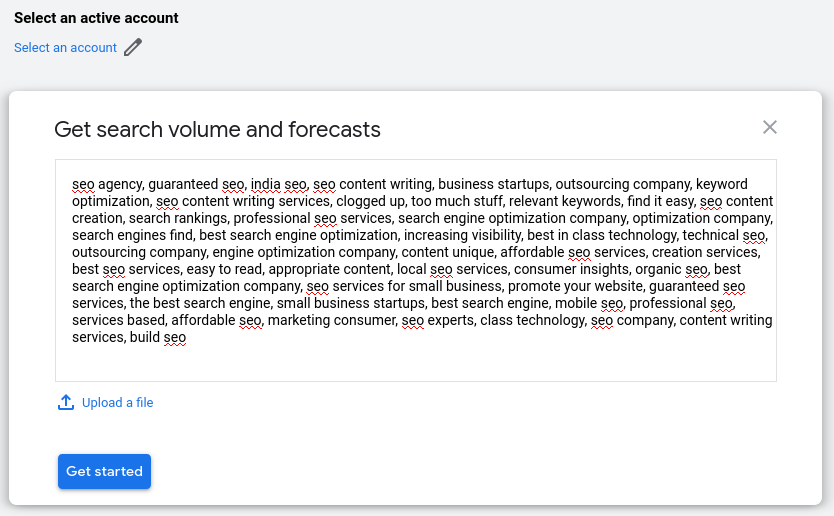
- Click “Get started”: The tool will show you the historical and forecasted metrics for your keywords, such as impressions, clicks, cost, CPC, CTR, etc.
https://support.google.com/google-ads/answer/7337243?hl=en
Why I should use zero search volume keywords for SEO ?
Zero search volume keywords are keywords that have little to no monthly searches according to keyword research tools, but careful analysis and keywording can show how they still influence rankings, conversions and overall seo performance.
- Zero search volume does not mean that this word will not be searched even once during the year, and historical analysis or search console data often confirms this.
- They may have more searches than the tools estimate, especially if they are new, trending, or niche. Keyword research tools rely on data from Google or other sources, which may not be accurate or up-to-date for all keywords.
- They are less competitive and easier to rank for than high-volume keywords. Zero search volume keywords are often long-tail keywords, which are more specific and relevant to your niche. They can help you target the user intent and attract qualified traffic that is more likely to convert and improve your ranking.
- They can help you cover a wide variety of topics and queries related to your niche. Zero search volume keywords can help you create comprehensive and useful content that answers the questions and needs of your audience. They can also help you discover new keyword opportunities and expand your keyword portfolio through continuous analysis and keywording.
- They are very likely synonyms and LSI which is a strong signal to the search engine that the site is relevant.
- They can complement your keywords to form keywords you didn't even think about. This greatly increases the list of keywords for which you can rank in the top 10 without even knowing it. But in the end, this will lead to an increase in organic traffic to the site and support your long term seo strategy and planning.
To sum up, zero search volume keywords can be valuable for SEO if you use them strategically and wisely. You should not ignore them just because they have low or no estimated searches. You should research them carefully and use them to create high-quality and relevant content that matches the user intent and provides value to your audience, while your internal keywording process and toolbest stack keep this work structured and measurable.
Summary
If you want to optimize your site for various types of searches, including voice and AI, Labrika is a great tool to use. It has a huge database of keywords and questions that can help you create better content for your audience. You can boost your organic traffic and your marketing strategy by following the steps above and applying Labrika to your site.
In practice this means you can run deep keyword search, generate keyword ideas, group related keywords, build an actionable keyword strategy, and manage keywording across pages, blog articles, commercial sections and product descriptions in one platform. The combination of technical analysis, content analysis, search rankings tracking and detailed suggestions transforms Labrika into a toolbest partner for agencies, in‑house teams and professionals who need accurate data, quick insights and scalable processes.
With Labrika you can align search engine optimization with business goals, identify target keyword groups for each page, refine internal links, enhance meta descriptions and headers, and plan how to create content that matches real users search terms. This structured approach to keywording and seo planning helps improve ranking stability, discover new opportunities in long tail keywords, and increase the value of every published page.
FREE TRIAL
Start your free trial now
Use the free trial period to test how Labrika’s keywording workflows, keyword suggestions, clustering, site-wide analysis and reporting toolbest set support your existing seo tools, analytics and digital marketing platform. During the trial you can start a complete keywording audit, check competition levels, view rankings dynamics, and build the first plan for content creation and optimization.
Features
Labrika’s core features focus on data-driven keywording and comprehensive analysis:
- Automatic keyword discovery and keyword suggestions for your domain based on real search terms, users search behavior and competitors’ pages.
- Advanced clustering tool that groups keywords by intent and helps you decide how to structure your website, sections and internal links.
- On-page analysis that checks how well each page uses its target keyword, related keywords and tail keywords, and how this impacts rankings.
- Technical seo analysis with checks for crawlability, tags, structure, speed and other factors that affect organic visibility.
- Content planning support through suggestions, new topic discovery, and quick briefs that simplify communication with your writing team.
Updated on January 20, 2026.
